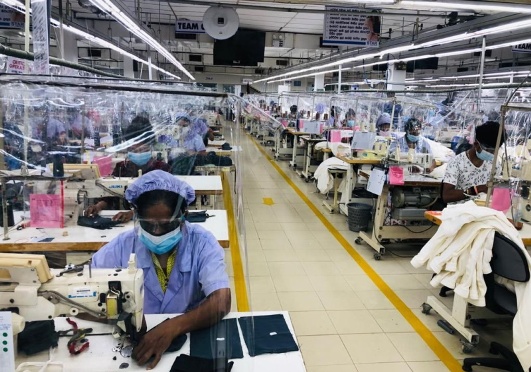COLOMBO – Sri Lanka’s garment industry is claiming that everything possible is being done to protect workers as factories remain open despite an alarming spike in COVID-19 cases caused by the highly contagious Delta variant.
The Sri Lankan government has introduced a strict 10-day lockdown to address record infection rates but the apparel industry has been declared exempt as an ‘essential service’ because of its economic importance.
The Joint Apparel Association Forum (JAAF), which represents export-oriented apparel manufacturers, their supply chain partners, buying offices and representatives of brands, has now issued a statement to reassure the country’s 300,000 garment workers.
JAAF said it shared the “understandable” concerns being expressed about worker safety in the apparel industry, and was working closely with the Ministry of Health (MOH) and other public authorities to protect employees.
It claimed the government had only taken its decision after examining the measures implemented by the industry to mitigate the risk of transmission of COVID-19 infections, including the Delta variant.
These included priority access to vaccinations. With the help of public health officials and the Sri Lankan Army, 90% of garment workers had now received their first dose of the COVID-19 vaccine, and more than half had received their second dose.
“In the coming weeks, the entire apparel industry workforce will be completely vaccinated,” JAAF pledged in a statement.
Meanwhile, workers are screened for symptoms before they are allowed to enter factories and are also subject to random temperature checks, while social distancing and other measures had been introduced.
Garment facilities also had to adhere to Ministry of Health protocols which included random testing and daily reporting of results which are also shared with local health authorities.
And the apparel industry had helped establish of 11 ‘intermediate care centres’, offering nearly 4,500 beds for employees, with another two centres under construction.
The JAAF statement said that garment workers had “responded magnificently” to the protective measures that companies had taken with more than 80% returning to work.
“We appreciate their determination and commitment to putting the economy back on its feet at this difficult time,” said JAAF secretary-general Tuli Cooray.
“For our part, we will do everything in our power to ensure they stay safe and protected, by pandemic-proofing workspaces, making sure they are all vaccinated completely and that the protective measures and healthcare infrastructure is available to them and their families.”
– ecotextile.com


